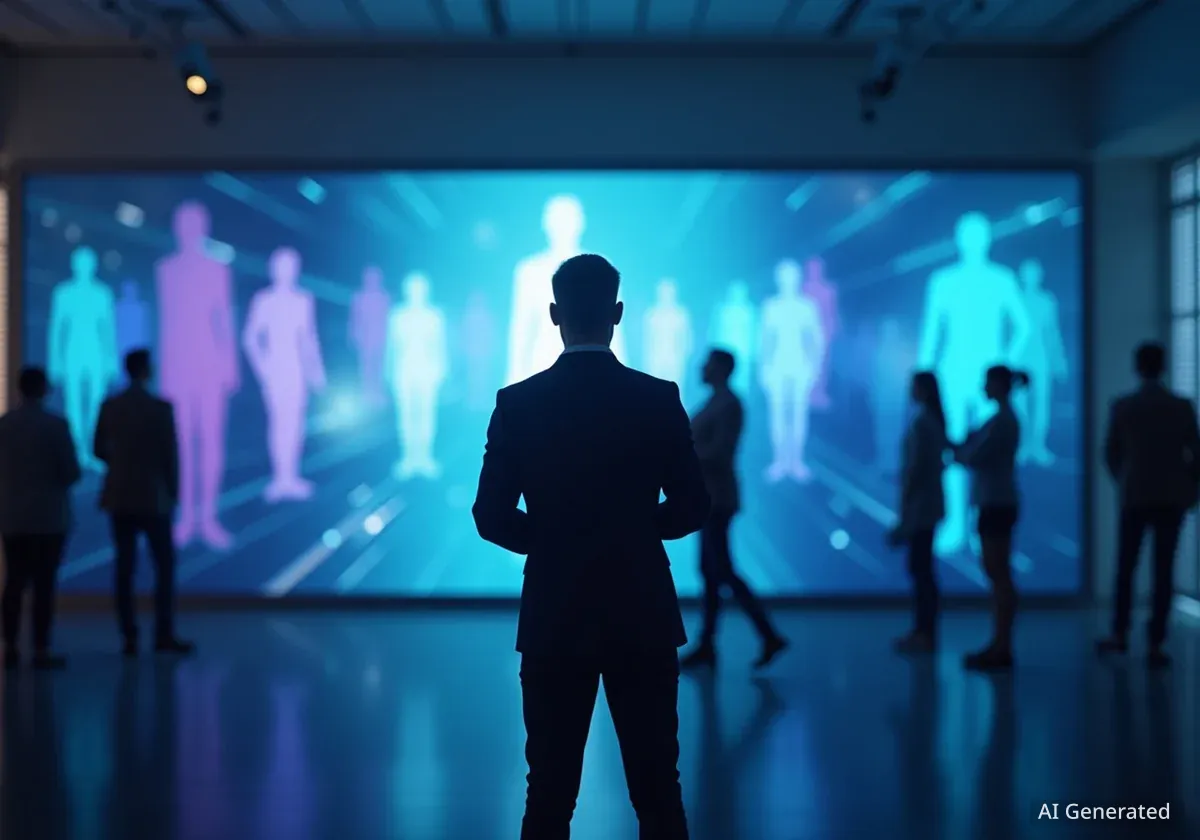Eline Van der Velden, the creator of the AI-generated actress Tilly Norwood, has issued a public statement addressing the significant backlash from the entertainment industry. The controversy began after it was revealed that talent agencies are considering signing the virtual character as a client, sparking widespread debate about the role of artificial intelligence in creative fields.
In her response, Van der Velden, who is also an actress and technologist, positioned Tilly Norwood not as a replacement for human performers but as a new form of artistic expression. The situation has drawn sharp criticism from several prominent actors, highlighting the growing tension between technological innovation and traditional roles in Hollywood.
Key Takeaways
- Eline Van der Velden, creator of AI actress Tilly Norwood, defends the character as "a piece of art" and not a substitute for human actors.
- The controversy erupted after news from the Zurich Summit indicated talent agents were interested in representing the AI character.
- Actors including Melissa Barrera, Kiersey Clemons, and Toni Collette have publicly criticized the development.
- Van der Velden compares AI to existing tools like animation and CGI, arguing it is an extension of creative possibilities, not a threat to the acting profession.
Zurich Summit Revelation Sparks Industry Outcry
The debate over AI in entertainment intensified following a panel discussion at the Zurich Summit, an event focused on the film industry. During the session, it was revealed that talent agents were actively exploring the possibility of signing Tilly Norwood, an entirely AI-generated character, to their rosters.
This news quickly spread across social media, prompting a strong negative reaction from many in the acting community. High-profile actors such as Melissa Barrera, Kiersey Clemons, and Toni Collette were among those who expressed their disapproval. Some discussions online even called for a boycott of any talent agency that agrees to represent AI-generated clients.
Who is Tilly Norwood?
Tilly Norwood is a virtual character created by Eline Van der Velden's AI-focused production company, Particle 6. The character was introduced to the public earlier this year through accounts on Instagram, TikTok, and YouTube, where she has been gradually building a social media presence. The recent launch of Xicoia, Van der Velden's new AI talent studio, brought the project further into the spotlight.
The backlash reflects deep-seated anxieties within the creative industries about the potential for AI to devalue human skill and displace workers. The idea of an AI entity competing for roles and representation strikes a nerve at a time when actors are already fighting for fair compensation and protections against digital likeness exploitation.
A Creator's Defense: AI as a New Paintbrush
In response to the growing criticism, Eline Van der Velden released a formal statement to clarify her intentions and defend her creation. She directly addressed the anger expressed by her peers in the acting community.
"To those who have expressed anger over the creation of my AI character, Tilly Norwood, she is not a replacement for a human being, but a creative work – a piece of art," Van der Velden stated.
She emphasized her own identity as an actor and argued that AI should be viewed as another tool in a creator's toolkit, much like established technologies that came before it. "I see AI not as a replacement for people, but as a new tool, a new paintbrush," she explained. "Just as animation, puppetry, or CGI opened fresh possibilities without taking away from live acting, AI offers another way to imagine and build stories."
Craftsmanship in a Digital Age
Van der Velden pushed back against the notion that creating an AI character is a simple or soulless process. She described the development of Tilly Norwood as an act that required significant creative input and technical skill.
"Creating Tilly has been, for me, an act of imagination and craftsmanship, not unlike drawing a character, writing a role, or shaping a performance," she wrote. "It takes time, skill, and iteration to bring such a character to life. She represents experimentation, not substitution."
Artistic Intent vs. Market Impact
Van der Velden noted that much of her work involves using satire to reflect on society. She suggests Tilly Norwood is part of this tradition, designed to spark conversation. However, the market's reaction—with agents seeking to sign the character—has shifted the conversation from artistic experiment to economic threat for many performers.
This defense frames AI characters as a separate category of performance art, rather than a direct competitor to human actors. According to Van der Velden, they should be evaluated on their own terms.
A New Genre or a Slippery Slope?
The core of Van der Velden's argument is that AI characters should be considered their own distinct genre, separate from human acting. She believes this distinction is crucial for understanding their place in the creative landscape.
"AI characters should be judged as part of their own genre, on their own merits… Each form of art has its place, and each can be valued for what it uniquely brings," her statement continued. This perspective suggests a future where human and AI-driven performances can coexist, each occupying its own niche.
However, critics remain unconvinced. The primary concern is that, regardless of artistic intent, the economic incentives for studios and agencies could lead to AI talent being favored over humans to cut costs. This could reduce opportunities for actors, writers, and other creative professionals.
- Economic Pressure: Studios might see AI actors as a way to avoid salaries, residuals, and union negotiations.
- Control and Availability: An AI character is available 24/7, never ages, and can be digitally manipulated for any role without physical limitations.
- Intellectual Property: The use of AI raises complex questions about copyright and who owns a performance generated by an algorithm.
Van der Velden concluded her statement with a plea for open-mindedness, hoping the industry can embrace this new technology as another form of expression. "When we celebrate all forms of creativity, we open doors to new voices, new stories, and new ways of connecting with each other," she urged.
The debate over Tilly Norwood is more than a fleeting controversy; it represents a critical juncture for the entertainment industry. As technology continues to advance, the lines between human and artificial creativity will become increasingly blurred, forcing artists, unions, and studios to define the future of performance itself.





